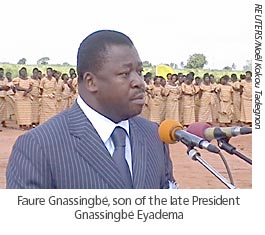New York, February 14, 2005—The Committee to Protect Journalists condemns the closures of several private radio stations in the capital, Lomé.
On Friday, February 11, Togolese authorities shuttered four stations that have protested the military’s appointment of the son of the late President Gnassingbé Eyadema as leader. Today, two more stations were closed.
According to local sources, security forces accompanied by representatives of Togo’s Telecommunication and Postal Services’ regulatory agency went to the offices of private radio stations Nana FM, Kanal FM, and Radio Nostalgie, as well as to the private television station TV7 and Fréquence 1, a radio station with the same owner, on Friday evening and ordered them off the air. The regulatory agency claimed that the stations owed the equivalent of thousands of dollars in unpaid broadcasting fees. Journalists at Nana FM and Kanal FM told CPJ that the stations’ phone lines were also cut.
Several hours after the stations had closed, a Lomé court ordered them suspended for one month at the request of the High Audiovisual and Communications Authority (HAAC), a government media regulatory body. According to local sources, the order accused the broadcasters of inciting “civil disobedience” and “racial hatred” on the air.
“These sweeping moves to silence independent voices and stifle important public debate are outrageous,” said CPJ Executive Director Ann Cooper. “Local journalists must be free to report on matters of public concern during this time of political transition.”
According to the Panafrican News Agency, riot police posted outside clashed with demonstrators who tried to prevent the stations’ closure.
Today, authorities shuttered two more broadcasters, Radio Carré Jeunes and Télévision Zion, again citing alleged unpaid administrative fees. The two broadcasters do not often carry political commentary, according to CPJ sources.
The closures come amid growing unrest in the capital following the death of Gnassingbé Eyadema, who had ruled the country for 38 years, and the army’s swift move to install one of his sons, Faure Gnassingbé, as president in defiance of the constitution. Parliament has amended the constitution to legitimize the move, but there has been a chorus of regional and international protest.
Private radio stations in Togo have been broadcasting critical debates and interviews about the situation, drawing a number of threats from the ruling authorities. Directors and news editors of private stations were summoned on February 10 to a meeting at the HAAC, during which an army spokesman told the radio stations that they must immediately stop the critical commentary.
Radio Lumière in Aného, about 31 miles (50 kilometers) east of Lomé, remains closed after police seized its equipment on February 10 and forced the station’s director into hiding, according to local sources. They said police accused the station of inciting violence after it aired critical debates.
![]()
